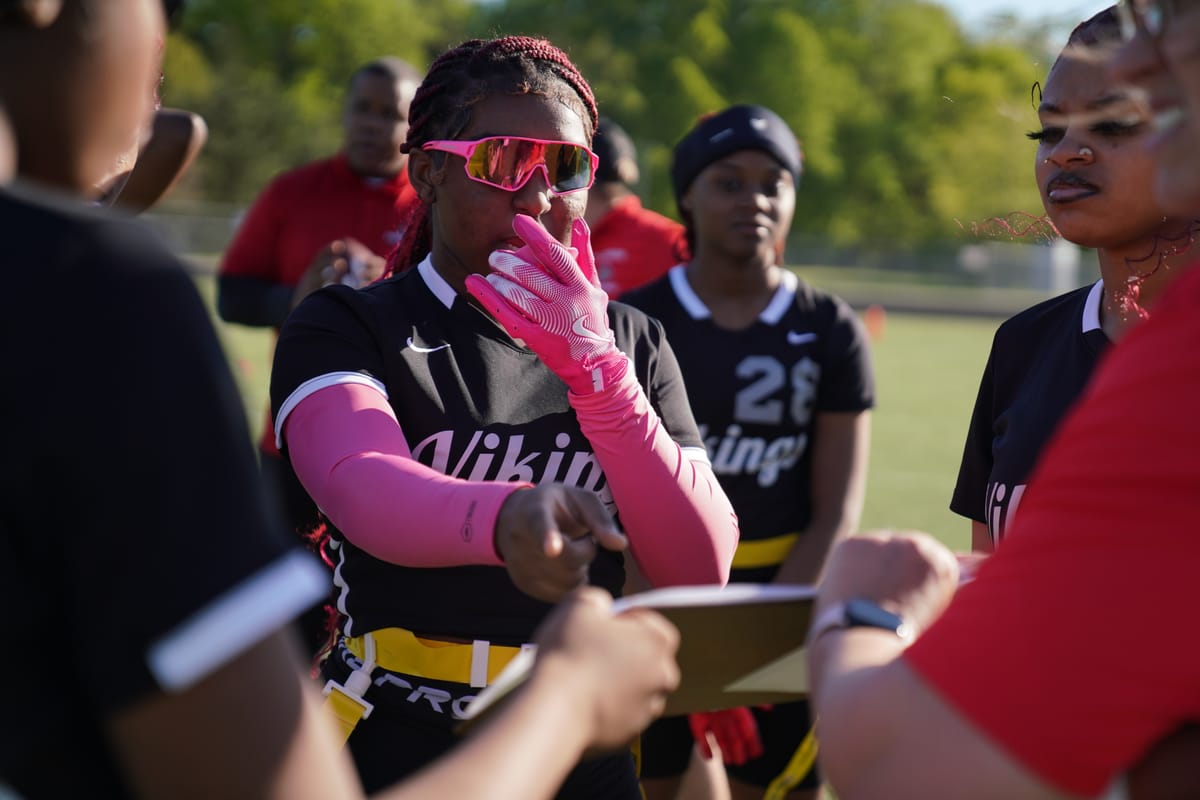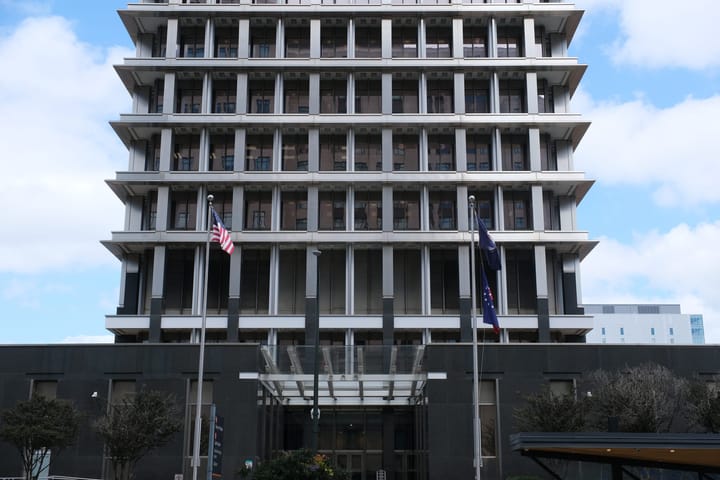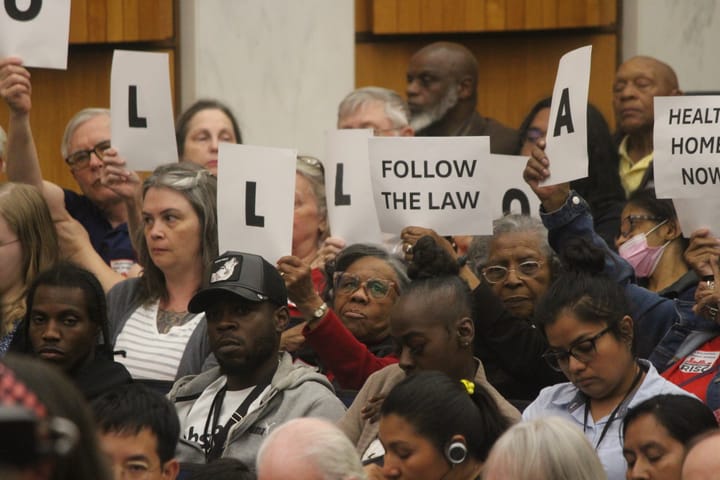Local nonprofits face major cuts in the city’s new budget. They’re warning of potential impacts.

Fifteen-year-old Jameelah Clemmons debuted as a flag-football quarterback on Wednesday night. She plays for Thomas Jefferson High School, whose team has dubbed itself the Vi-queens, a play on the school’s Vikings mascot.
It was her first time ever playing the sport, because the game was just recently introduced to Richmond Public Schools high school girls as a free after-school club.
“Even though we’re not doing what the boys are doing, like tackling, we still get to play,” she said.
For some of her teammates and girls on other teams, it was their first time playing in a team sport, but it could end before future girls get to play.
That’s because some of the city money that helps pay for the program, referred to as Positive Youth Development (PYD) funding, is on the chopping block for fiscal year 2026.
NextUp RVA, a nonprofit that expands access to out-of-school programs, normally receives that funding before partnering with other nonprofits to help administer the programs. Their PYD funding is set to be cut in half next year, from $1 million to half a million dollars.
Traymanesha Lamy, CEO and president of NextUp RVA, said the programs that PYD funds directly impact the community, especially when it comes to youth gun violence.
The funds were initially created in 2021 after the city declared gun violence a public health crisis. Last fall, Richmond Police Chief Rick Edwards noted that youth shootings were down 65% from 2017. Participation in out-of-school programs was cited as a factor.
That includes Greater Richmond Fit4Kids, which helps administer the girls flag-football club. Mary Dunne Stewart, CEO and President of Fit4Kids, said the program couldn’t have existed without the PYD funds.
“There are very significant fiscal challenges that the city is facing, but these funds are on the ground creating programs for kids that are really making a meaningful difference,” she said.
Tight budget, tough decisions
About 40 other nonprofits and organizations in the city are reeling with the potential reality of having to scale back programs and services for vulnerable clients they serve.
Mayor Danny Avula has expressed that funding for the city is tight this year due to inflation, rising costs, previously negotiated salary increases and unforeseen events like the water outage. During a budget work session Wednesday, two City Council members proposed adding back some funding for nonprofits, but to do so they will have to find cuts elsewhere.
The city auditor issued a report earlier this year raising major issues about the city’s process for contributing to outside organizations. Of the $6 million in grant funding given to outside organizations in fiscal year 2023, nearly 25% may not have met the city’s own requirements.
Avula has said he intends to overhaul the nonprofit funding process for next year’s budget, but it is too late in the process to do so for the upcoming cycle.
Dunne Stewart said the cuts are coming at a time when nonprofits are already struggling as a result of uncertainty with federal funding.
“The philanthropic sector just can't pick up all the cuts that are happening, so it's a real challenge,” she said.

Families are already met with the financial burden of taking care of their children, and free after-school programs like the girls flag football team alleviate that stress, Lamy said.
“[I don’t want] to see a kid left at home alone because there’s no after school program to send them to,” she said. “And not have that evening snack that they’re going to get if they’re in after school.”
Disappointment, disbelief
The grant cuts also impact organizations in the arts, like the Black History Museum & Cultural Center of Virginia and the Richmond Symphony.
BHMVA received funding from the city for over five years, said Executive Director Shakia Gullette Warren. The museum has received a $100,000 grant every year since 2023 from the city, but at the moment would not receive anything in 2026.
The money has gone toward free programming for children, like a book festival, and community events related to current exhibitions focused on topics like health in the Black community. Warren said Jason Kamras, superintendent of Richmond Public Schools, supported the museum in a letter in 2023.
“These programs enhance overall understanding of our communities and the value everyone brings collectively,” Warren said.
Warren said that organization was “understandably disappointed” when they found out about the potential cuts, adding that the museum has been growing in exhibitions, programs, community engagement initiatives, visits, and tours, and is faced with the challenge to continue to grow “as there are measures underway to erase our history.”
The proposed budget also cuts the Richmond Symphony’s grant with the city, which was $50,000 this year. Lacey Huszcza, president and CEO of the symphony, said that while there was disappointment and surprise about the cut, she couldn’t imagine how difficult it might be to “make decisions for a whole city” with limited funds.
Huszcza said the symphony has a direct impact on the city’s economy through visitors’ use of restaurants, parking and hotels when attending its concerts and events. The arts can also raise the health and wellness of a city by bringing people together, especially if they’re free, she said. That’s the case for two of their free musical events – The Big Tent and Mile of Music – that the projected cut grant normally funds.
“We know that that loss of funding will have a direct effect on the free community programming we've been providing in the city of Richmond for many,” she said.
But this is what is involved in running a nonprofit, Huszcza said, acknowledging that funding isn’t always promised, especially as costs rise and funding decreases.
“The general life worry of running a nonprofit is, ‘How do we make up for that and still create the impact and the power that we believe our nonprofits present?’”
Nonprofits helping people impacted by the criminal justice system are also experiencing cuts. Opportunity Alliance and Reentry of Richmond, an organization providing reentry services, was allotted $100,000 from the city for fiscal year 2025. They requested an additional $50,000 for next fiscal year. Instead, the mayor’s proposed budget would grant them $50,000.
Executive Director Sara Dimick said her initial reaction to the projected decrease was “disbelief.”
“We have been a trusted partner of the City and so we expected at least level funding,” she told The Richmonder in an email.
The grant covers community services and resources provided at the Richmond City Justice Center, like their Jail Mental Health Program, which provides assistance to those with a mental health diagnosis after they’re released from jail. Dimick said they serve over 5,000 individuals annually who are either currently incarcerated or recently released.
OAR has had to make a reduction in force, Dimick said, as a result of funding cuts made locally, statewide and federally, while working to ensure that the services provided are still meeting the needs of clients.
“I am worried,” Dimick said. “OAR needs the community’s support.”
All three leaders expressed their efforts to keep offering the programs they provide, but acknowledged that the cuts make that endeavor difficult and will further impact the people they serve.
“We are honored to be a space that supports our city's tourism industry,” Warren said. “To do so, it is important to ‘keep the lights on’ and part of the funding BHMVA has received from the City helps us do that.”
Note: This story has been corrected to include the current name of OAR of Richmond. It is Opportunity Alliance and Reentry, not Offender Aid and Restoration.
Contact Reporter Victoria A. Ifatusin at vifatusin@richmonder.org







